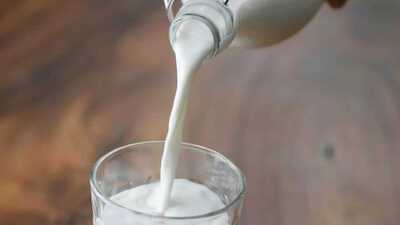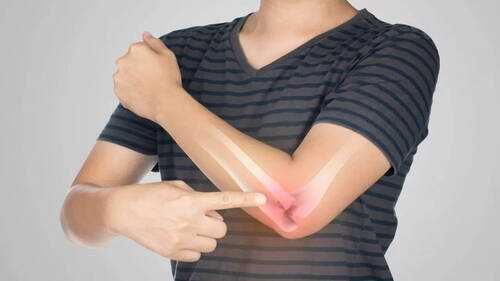That glass of milk has long been marketed as the ultimate bone-strengthener, packed with calcium and vitamin D. For decades, parents have nudged children to drink milk daily with the promise of stronger teeth and unbreakable bones. But what if we told you that too much milk might actually do the opposite?
According to a 2014 study published in The BMJ, researchers found that people who drank three or more glasses of milk a day had a higher risk of bone fractures and even increased mortality rates compared to those who consumed less. This surprising finding challenges the conventional wisdom that “the more milk, the better.” While milk certainly plays a role in bone health, overconsumption may come with unexpected risks.
Video
So, should you stop drinking milk altogether, or is moderation the key? Let’s break down the science, myths, and practical tips about milk and bone health.
Milk and bone health: The traditional view

For decades, milk has been positioned as an essential food for bone growth and maintenance. The calcium in milk helps in the formation of bone tissue, while vitamin D aids calcium absorption. That’s why children, teenagers, and even adults are advised to consume dairy regularly. Advertising campaigns from the mid-20th century, like the famous “Got Milk?” slogan, reinforced the belief that milk equals stronger bones.
There is truth in this. Studies confirm that adequate calcium intake reduces the risk of osteoporosis, especially in women post-menopause. However, drinking excessive amounts of milk does not necessarily double or triple those benefits. Bones have a limit to how much calcium they can absorb, and the rest is simply processed by the body. This raises the question: what happens when milk intake goes beyond what your body needs?
Too much milk and potential risks
Drinking milk in moderation is beneficial, but regularly consuming three or more glasses per day could pose risks. Some researchers suggest that the high levels of lactose (a natural sugar in milk) may lead to inflammation in the body. Chronic inflammation is linked to weaker bones, not stronger ones.
Additionally, milk contains D-galactose, a type of sugar that, when consumed in excess, has been associated with oxidative stress and accelerated ageing in animal studies. While this does not mean milk is dangerous, it points to why balance is crucial. People who rely solely on milk for their calcium and vitamin D might actually be missing out on the diverse nutrients available in other foods like leafy greens, legumes, nuts, and fortified cereals.
Can too much milk cause brittle bones?

This is where it gets counterintuitive. You would expect more milk to mean stronger bones, but some research suggests otherwise. Excessive milk consumption may increase fracture risk rather than reduce it. One theory is that when the body processes large amounts of milk protein, it produces acid by-products. To neutralise this acid, calcium is leached from the bones, weakening them over time.
While the evidence is still debated among scientists, what’s clear is that balance works better than extremes. A couple of glasses of milk per day, paired with a calcium-rich diet from other sources, is generally enough for most adults.
Alternatives to milk for bone strength
Milk isn’t the only way to care for your bones. Some excellent non-dairy sources of calcium and vitamin D include:
Pairing these foods with regular physical activity, especially weight-bearing exercises like walking or strength training, can improve bone density more effectively than milk alone.
So, is milk a friend or foe for your bones? The answer lies in moderation. One or two glasses a day, combined with a varied diet and regular exercise, is generally safe and beneficial. But chasing down multiple glasses every day in hopes of extra protection could backfire. Your body needs balance, not overload.
Milk is not the enemy, but it’s also not a magic bullet. The old saying “too much of a good thing can be harmful” applies here perfectly. While milk provides essential nutrients for bone strength, overconsumption may actually increase risks rather than reduce them. The smart approach is to treat milk as part of a balanced diet, not the centre of it.
Combine moderate milk intake with nutrient-rich foods and healthy lifestyle choices, and your bones will thank you in the long run.
Disclaimer: This article is for general informational purposes only and is not a substitute for professional medical advice, diagnosis, or treatment. Always seek the guidance of a qualified healthcare provider regarding any medical condition or lifestyle change.
Also read| How baking soda makes crispier French fries; Know this simple kitchen trick
According to a 2014 study published in The BMJ, researchers found that people who drank three or more glasses of milk a day had a higher risk of bone fractures and even increased mortality rates compared to those who consumed less. This surprising finding challenges the conventional wisdom that “the more milk, the better.” While milk certainly plays a role in bone health, overconsumption may come with unexpected risks.
Video
So, should you stop drinking milk altogether, or is moderation the key? Let’s break down the science, myths, and practical tips about milk and bone health.
Milk and bone health: The traditional view
For decades, milk has been positioned as an essential food for bone growth and maintenance. The calcium in milk helps in the formation of bone tissue, while vitamin D aids calcium absorption. That’s why children, teenagers, and even adults are advised to consume dairy regularly. Advertising campaigns from the mid-20th century, like the famous “Got Milk?” slogan, reinforced the belief that milk equals stronger bones.
There is truth in this. Studies confirm that adequate calcium intake reduces the risk of osteoporosis, especially in women post-menopause. However, drinking excessive amounts of milk does not necessarily double or triple those benefits. Bones have a limit to how much calcium they can absorb, and the rest is simply processed by the body. This raises the question: what happens when milk intake goes beyond what your body needs?
Too much milk and potential risks
Drinking milk in moderation is beneficial, but regularly consuming three or more glasses per day could pose risks. Some researchers suggest that the high levels of lactose (a natural sugar in milk) may lead to inflammation in the body. Chronic inflammation is linked to weaker bones, not stronger ones.
Additionally, milk contains D-galactose, a type of sugar that, when consumed in excess, has been associated with oxidative stress and accelerated ageing in animal studies. While this does not mean milk is dangerous, it points to why balance is crucial. People who rely solely on milk for their calcium and vitamin D might actually be missing out on the diverse nutrients available in other foods like leafy greens, legumes, nuts, and fortified cereals.
Can too much milk cause brittle bones?
This is where it gets counterintuitive. You would expect more milk to mean stronger bones, but some research suggests otherwise. Excessive milk consumption may increase fracture risk rather than reduce it. One theory is that when the body processes large amounts of milk protein, it produces acid by-products. To neutralise this acid, calcium is leached from the bones, weakening them over time.
While the evidence is still debated among scientists, what’s clear is that balance works better than extremes. A couple of glasses of milk per day, paired with a calcium-rich diet from other sources, is generally enough for most adults.
Alternatives to milk for bone strength
Milk isn’t the only way to care for your bones. Some excellent non-dairy sources of calcium and vitamin D include:
- Leafy greens such as kale, spinach, and collard greens.
- Nuts and seeds, especially almonds and chia seeds.
- Fortified foods like soy milk, oat milk, and breakfast cereals.
- Fish with edible bones, such as sardines and salmon.
Pairing these foods with regular physical activity, especially weight-bearing exercises like walking or strength training, can improve bone density more effectively than milk alone.
So, is milk a friend or foe for your bones? The answer lies in moderation. One or two glasses a day, combined with a varied diet and regular exercise, is generally safe and beneficial. But chasing down multiple glasses every day in hopes of extra protection could backfire. Your body needs balance, not overload.
Milk is not the enemy, but it’s also not a magic bullet. The old saying “too much of a good thing can be harmful” applies here perfectly. While milk provides essential nutrients for bone strength, overconsumption may actually increase risks rather than reduce them. The smart approach is to treat milk as part of a balanced diet, not the centre of it.
Combine moderate milk intake with nutrient-rich foods and healthy lifestyle choices, and your bones will thank you in the long run.
Disclaimer: This article is for general informational purposes only and is not a substitute for professional medical advice, diagnosis, or treatment. Always seek the guidance of a qualified healthcare provider regarding any medical condition or lifestyle change.
Also read| How baking soda makes crispier French fries; Know this simple kitchen trick
You may also like

A time capsule from 8,500 years ago: Archaeologists discover preserved city under the ocean

Peter Navarro ignites outrage with 'Brahmin' attack

Flood alert in Delhi after water released from Hathni Kund in Haryana

Ammy Virk, Guru Randhawa & others lend their support to those affected by Punjab floods

Indian equity indices witness sharp rally on resilient Q1 GDP data, SCO outcomes







